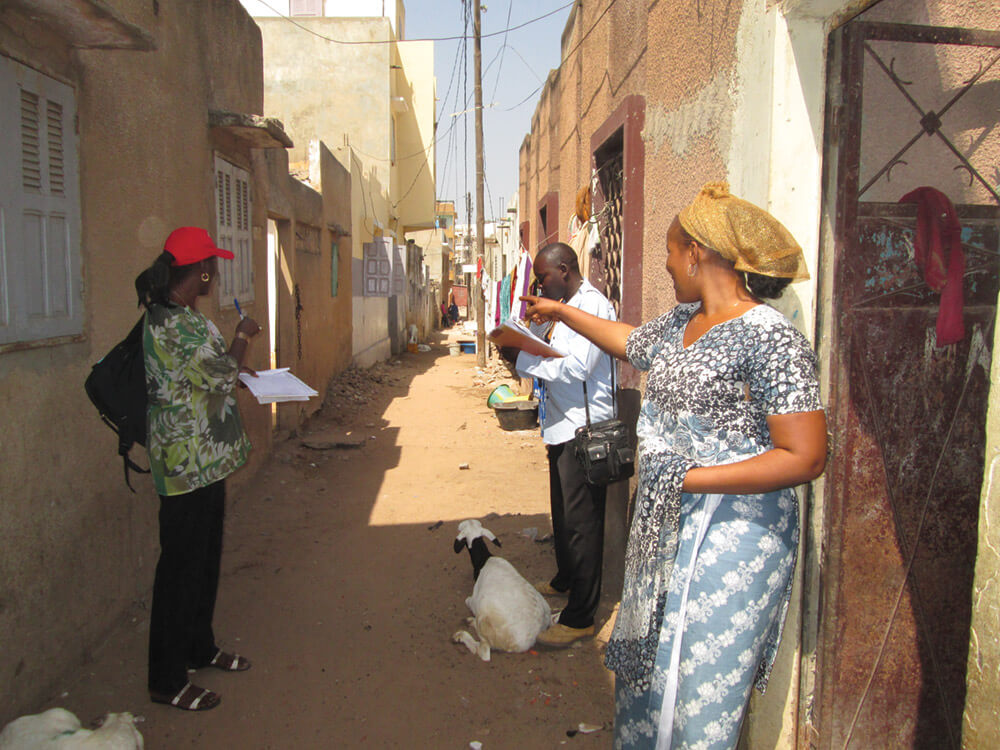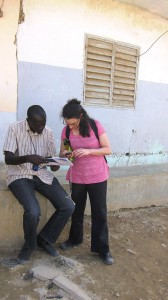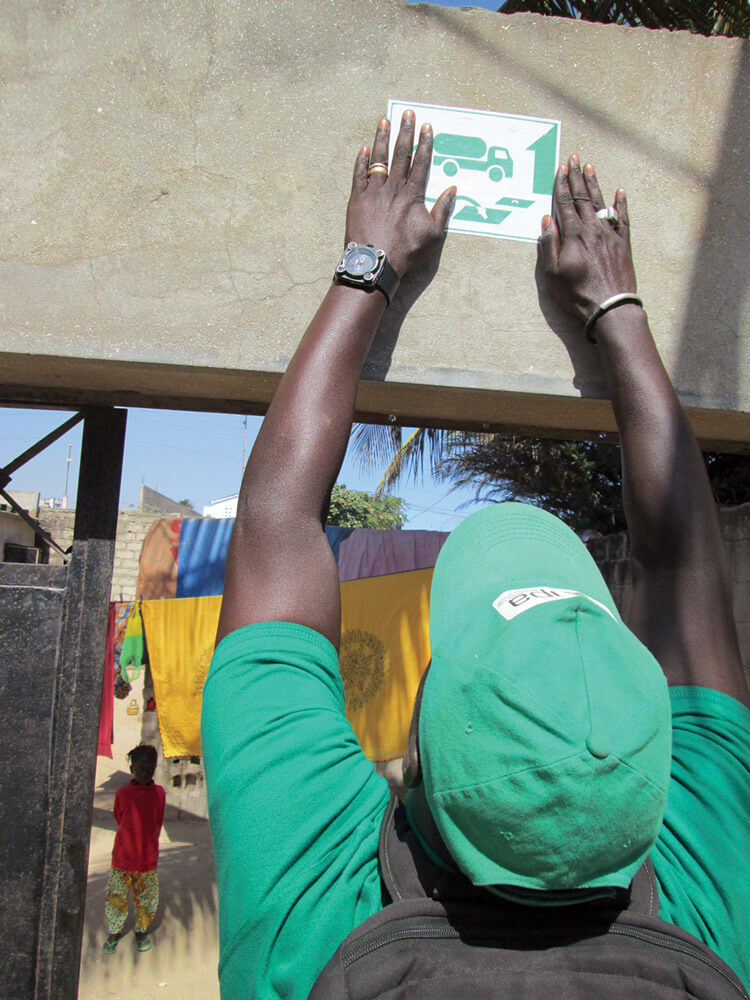Desludging Dakar

During a sanitation baseline survey to determine what desludging systems residents are currently using, survey-team members get directions to the next respondent’s house from a woman (right) whom they just finished interviewing. Photo: Ahmadou Kandji
Pioneering behavioral economist Laura Schechter is turning to group dynamics, altruism, and cell phones to improve sanitation in areas without access to modern plumbing.
For children living in the outskirts of Dakar, Senegal, playing an innocent game of tag in the street often entails something distinctly unpleasant — dodging puddles of raw sewage. In this crowded city perched on the western tip of the African coastline, millions of people have no access to the modern sanitation systems that most Americans take for granted. Dakar’s youngest residents are particularly vulnerable, as contaminated water can lead to diarrhea, the second-most common cause of infant death worldwide.
Laura Schechter aims to change that.
A UW–Madison associate professor of agricultural and applied economics and a rising star in the field of behavioral economics, Schechter is crafting meticulous mathematical models that explore economic decision-making through the lens of human trust, reciprocity, and altruism. Her work is transforming the way that neighborhoods in the underserved outskirts of Dakar dispose of their sewage.

During a field visit, Professor Laura Schechter (right) and Innovations for Poverty Action (IPA) project coordinator Ahmadou Kandji review a satellite image of the neighborhood they’re visiting in the Senegalese capital of Dakar. Photo: Madelyn Bagby
With no underground infrastructure to whisk waste away, a family with a pit toilet that has filled to the brim has two choices: paying someone to climb down inside the pit and empty the contents, bucket by bucket, somewhere within easy carrying distance; or hiring a sanitation truck to remove the sludge and transport it to one of the city’s treatment facilities.
“We are looking at how we can harness reciprocity and altruism to get individuals to choose more sanitary techniques,” says Schechter. “For example, if you choose the usual, unsanitary way of desludging, you are dumping on the streets where kids play, and it’s bad for the whole neighborhood. How can we convince people to choose the sanitary option, not just for themselves, but out of respect for their neighbors? In the context of a developing country where there is no unemployment insurance or Medicaid, it’s especially important to understand how interpersonal aspects affect economic decisions.”
Schechter is collaborating with Molly Lipscomb at the University of Virginia and Jean-François Houde at the Wharton School at the University of Pennsylvania on this multidimensional study, which is funded by the Bill and Melinda Gates Foundation with grant management by Innovations for Poverty Action (IPA), an American nonprofit dedicated to researching better ways to help the world’s poor. The project goal is getting as many families as possible to choose mechanized desludging, which will help to reduce early childhood mortality in Dakar and other developing communities.
“Getting people to convince their neighbors to use mechanical desludging would be huge,” says Lipscomb. “We are really lucky that Laura has agreed to work with us on this. … She is one of the principal researchers working on social networks in developing countries.”
Quick to give credit to others, Schechter says that fellow Badger and IPA staffer Sarah Nehrling ’06 has served as project supervisor for the desludging initiative in Dakar and “is absolutely amazing at juggling all the many moving parts of this project.”
Schechter, who did her undergraduate and graduate work at Berkeley, says that she was drawn to the UW by its long history in international development projects through its Department of Agricultural and Applied Economics.
“The kind of work Laura is doing is representative of real cutting-edge research,” says Ian Coxhead, the department’s chair. “A more traditional aid project would be operated from the top down, telling people, ‘We are going to change the way you do things, and here’s how it’s going to work.’ Instead, this method helps people think it through in terms of their own interests.”
Coxhead notes that the developing world is littered with traditional projects where someone comes along and digs a well, but because they haven’t really integrated it into the way people behave, the well is neglected and ultimately abandoned. Game over.
Schechter’s work is helping to build project accountability into an experimental design, which ultimately will demonstrate how well the project has met its goals. “Not only do you attempt to change something [with this approach], but you make sure you can learn from it,” Coxhead says. “The takeaway can be useful somewhere else.”
Schechter is putting her pioneering techniques to use this year during a sabbatical at Yale University, where she is working with Christopher Udry, a professor in the Yale economics department and its Economic Growth Center and Council on African Studies.
Udry says that Schechter has gained insights “from really thoughtful combinations of economic theory, statistics, and her on-the-ground, deep institutional knowledge. It’s been a goal for a long time, but it is still rare to achieve the combination of advanced statistics skills — with the patience to invest in understanding people in their context — that Laura puts together,” he says, adding that she has published a series of papers that have changed the way that social scientists and economists think. “Her work really shapes our understanding of how the world works.”

The IPA cartography team prepares for a sanitation survey in Dakar. They head into neighborhoods with GPS devices, satellite images, and electronic questionnaires in order to identify, map, and describe the houses that will be surveyed. Photo: Sarah Nehrling.
Schechter’s one-two punch of real-world understanding and advanced analytical skills grew out of her work in the Peace Corps in Paraguay, where she developed questions she brought with her to her graduate research.
“During my time in the Peace Corps, it seemed like there were a lot of development projects that were not successful because people didn’t behave in the way traditional economic modeling would predict,” Schechter says. For instance, she mentions an effort to encourage a cooperative so that communities could benefit from strength in numbers. A farmers’ committee in the village where she worked was given money to buy a chain saw to be kept at one member’s house and shared by all, but the tool was of little use to the community after the blade was removed and sold. “It is easier to promote development within groups, but you need to understand how people work in groups,” she says.
As Schechter entered graduate school, she began to explore mathematical models that could explain what she had seen in Paraguay. “I wondered if there were ways I could measure trust or the lack of trust,” she says. She initially pursued experiments with college students, using something called the Trust Game, which involves two players who don’t know who they are playing with. The first player, the truster, is given a specific amount of money — say $10. The truster can choose how much money he or she wants to send to the second player, called the trustee. Whatever amount the truster sends gets tripled. If the truster sends $5, the trustee gets $15. Then the trustee can choose to keep all of the $15, return it, or return any portion of it.
“How much the truster sends is often used as a measure of trustingness,” says Schechter. “How much the trustee returns measures trustworthiness. We tweaked this game to understand interpersonal relationships within villages. In some versions of the game, the donors are revealed afterwards. Then how much you give is a measure of your fear of sanctions and your hope for rewards in your village.”
Taking the game a step further in Dakar, Schechter’s research involves selecting a random group of residents who are offered discounts for pump-truck desludging. In some cases, neighbors are informed that the trial subjects have been offered a discount; in other cases, they are not. She then monitors the desludging choices made by each of the two groups offered the discount.
“When your neighbors know you’ve been given a really good price to use the trucks, that should create social pressure for you to use the more sanitary method,” Schechter says. “This is one of the ways we are testing how a neighbor’s opinion affects your economic decisions — and this is how I originally got involved — but the project has turned into so much more.”
Usually, anyone who wants to have a latrine emptied by truck must travel some distance to a garage where desludgers congregate and negotiate the price on the spot. The bargaining advantage is heavily weighted against the client in the intimidating atmosphere of one customer versus many truckers who are all determined to keep their price high.

An IPA worker puts a subscription sticker on a house in Pikine, Dakar, which signals to the homeowner’s neighbors that he has signed up for a mechanical desludging program. Photo: Sarah Nehrling.
Schechter and her colleagues have created a call-in center so that all a customer has to do is call and request a truck. At the center, a dispatcher then sends out a bid to as many as fourteen desludgers. They receive a text message, such as, “Someone near the French Hospital wants a desludging. How much will you bid for this job?” The truckers have an hour to bid, during which they can compete back and forth. The price is pushed down, and at the end of the hour, the lowest bid wins the job. The standard price has already dropped from 27,500 West African francs to about 24,500 — a decrease of about six dollars.
Brainstorming the logistics of the call-in center led to a second breakthrough. The center needed a way to collect money from households and pay the desludgers, but sending people out to collect paper money was a logistical nightmare. That’s when the idea of using mobile phones for money transfer came into play.
People in developing countries don’t have many options for saving money besides keeping cash in their homes, and having all their money in the house is problematic. It’s hard to say no to impulse purchases when money is within such easy reach. Surprisingly, though, “Cell phones are everywhere,” Schechter says.
“The households we work with in Dakar tend to be large — with an average of ten people — and in almost every case, one member of the household has a cell phone,” she says. “In fact, cell phone use has become a major part of our project. In our program, participants can accumulate savings in a mobile-money account and use it to make payments for desludging services.”
Schechter and her fellow researchers are still analyzing data from the peer-pressure study, but lowering the price of truck desludging is showing immediate results in improved sanitation.
“We opened a beta-testing call-in facility covering a small area of Dakar and then expanded to a slightly larger area,” she says. “Now we are in the process of spreading out so anyone in the entire city will be eligible. It’s amazing to think that we started one call-in center that may revolutionize a system in a city of millions of people.”
“The process may spread all across Senegal in the next few years,” says Lipscomb. “The Ministry of Sanitation is really excited about this. I think a lot of countries are starting to see how well it’s working in Senegal and thinking about establishing their own programs. We are still collecting data and looking at the impacts, but it’s definitely working, and it’s exciting.”
It’s no wonder that Schechter finds her work gratifying. “Experimenting with ways to employ social pressure to get people to adopt a cleaner waste-treatment technology is my first foray into research that can immediately make people’s lives better,” says Schechter. “It’s both exciting and a little overwhelming.”
Freelance writer Denise Thornton is based in Wisconsin’s Driftless Area, where she blogs at digginginthedriftless.com.
Published in the Spring 2015 issue



Comments
No comments posted yet.